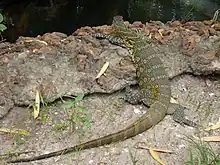West African Nile monitor
The West African Nile monitor (Varanus niloticus stellatus) is a subspecies of monitor lizard that is native to West African forests and adjacent savannah (east to northern Cameroon).[1] It has also been introduced to Florida, United States, where it is considered invasive.[2]
| West African Nile monitor | |
|---|---|
.jpg.webp) | |
 | |
| Two individuals in Gambia, which based on location are West African Nile monitors[1] | |
| Scientific classification | |
| Domain: | Eukaryota |
| Kingdom: | Animalia |
| Phylum: | Chordata |
| Class: | Reptilia |
| Order: | Squamata |
| Family: | Varanidae |
| Genus: | Varanus |
| Species: | |
| Subspecies: | V. n. stellatus |
| Trinomial name | |
| Varanus niloticus stellatus (Daudin, 1802) | |
This cryptic species has traditionally been included in the Nile monitor (V. niloticus), but from 1997 to 2015 it was often considered as the western population of the ornate monitor (V. ornatus). Compared to the other members of the Nile monitor species complex (which also includes the ornate monitor of Central Africa), the West African Nile monitor has a genetic sequence divergence of more than 8%, meaning that they separated about 7.7 million years ago. This is a larger divergence than between humans and chimpanzees.[1][2] Despite this, the Reptile Database continues to place it within the Nile monitor, but do note that this broad species definition includes distinctive clades.[3]
References
- Dowell, Stephanie A.; Portik, Daniel M.; de Buffrénil, Vivian; Ineich, Ivan; Greenbaum, Eli; Kolokotronis, Sergios-Orestis & Hekkala, Evon R. (2016). "Molecular data from contemporary and historical collections reveal a complex story of cryptic diversification in the Varanus (Polydaedalus) niloticus species group". Molecular Phylogenetics and Evolution. 94 (Pt B): 591–604. doi:10.1016/j.ympev.2015.10.004. PMID 26475616.
- Yong, Ed (20 April 2016). Florida’s Dragon Problem. The Atlantic. Retrieved 15 September 2019.
- Varanus niloticus at the Reptarium.cz Reptile Database. Accessed 15 September 2019.